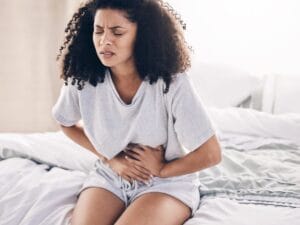Are you one of the millions of people who suffer from Irritable Bowel Syndrome? This common condition affects 5-10% of the world’s population, with women more commonly affected than men. There’s a vast amount of diet advice on the internet for IBS sufferers, but unfortunately, a lot of it is not backed by scientific evidence. So, what is the best Irritable Bowel Syndrome self-care diet? Let’s find out.
What is Irritable Bowel Syndrome?
Irritable Bowel Syndrome (IBS) is the name of a group of symptoms that affect your small and large intestines (also called the colon).
The symptoms are:
- Pain
- Bloating
- Alternating constipation and diarrhea
- Excess gas
- Noisy, rumbling sounds and sensations (borborygmus)
There are 3 different categories of IBS according to what type of bowel movements you experience when your symptoms flare up.
- IBS-D is characterized by predominantly soft, watery stools and diarrhea.
- IBS-C causes constipation and dry stools that are harder to pass.
- IBS-M is a mixture of both constipation and diarrhea.

What Causes IBS?
Most IBS sufferers have a combination of triggers for their symptoms. These range from stress, processed food, and poor sleep to anxiety, food intolerances, and pre-menstrual syndrome (PMS). Some people develop IBS after a bout of food poisoning or a gut infection.
There is, however, one clear connection between these triggers: They all affect the balance and diversity of the gut microbiome.
The billions of different microbes that make up your gut microbiome are responsible for digestive health, bowel regularity, immune health, managing inflammation, and supporting mental well-being.
Your gut hosts around 70% of your immune cells and produces 60% of your neurotransmitters. These gut bugs are critical to health! When they are disrupted, they can trigger inflammation and unpleasant IBS symptoms (Menees et al, 2018).
What Else Might be Causing These Symptoms?
The symptoms of IBS are similar to many other bowel conditions and it’s important to have these issues ruled out by your doctor:
Inflammatory Bowel Disease (IBD).
Bowel and ovarian cancer.
Parasite infection.
Why is an Anti-Inflammatory Diet Important for IBS?
Although IBS isn’t classed as an inflammatory bowel disorder, research shows that low-grade inflammation is involved in the development and progression of the condition (Ng et al, 2018).
So, where does this inflammation come from? As I mentioned before, your gut microbiome plays a key role in regulating inflammation in the digestive system and throughout your body.
When the gut microbes are disturbed by stress, infection, poor diet, chronic lack of sleep – or any other triggers associated with IBS – inflammation occurs. Because of this, the best diet for IBS is one that:
- Reduces inflammation.
- Contains the nutrients you need to manage stress and optimize mental well-being.
- Supports a healthy, balanced gut microbiome.

The Best Irritable Bowel Syndrome Self-Care Diet
If you are overwhelmed by nutrition advice for IBS and gut health, I urge you to start with our Eat Burn Sleep program. The Eat Burn Sleep anti-inflammatory lifestyle is the best safe, natural, long-term, 360-degree treatment for Irritable Bowel Syndrome.
The program includes extensive food lists, meal plans, and recipes based on anti-inflammatory foods. These foods support healthy gut function and help you build resilience to stress.
Our Movement videos help you stay active and strong without causing additional stress to your body. After all, stress is a major trigger for IBS, and exercising too intensely can be unhelpful.
And if anxiety and poor sleep are worsening your IBS, our Meditation Guides are perfectly suited to support relaxation and restful, restorative sleep. Your gut does a lot of ‘housekeeping’ work while you sleep and proper rest is vital for managing IBS.
Still unsure whether EBS can help? This is what EBS member Pina says about our program…
The IBS and Digestive Issues Masterclass was amazing. Great information on what to avoid during flare-ups. The sugar and fiber were an eye-opener for me. This is why I always renew my membership!
And Naouel no longer has stomach aches and bloating:
I used to have stomach aches after each meal and I no longer have these. I lost 16kg in one year with no feeling of being hungry or frustrated and I have no more bloating. I move, work, socialize, and face problems with no effect on my health whatsoever.
I have not taken painkillers or pills since I have been following the EBS lifestyle. An amazing life change!
If you’d love to have results like these, check out what’s on offer in our membership options here and say goodbye to IBS for good.
You might also enjoy these videos and articles
Exploring Inflammation and Gut Health
Inflammatory Dairy Products: A Guide to Safe Consumption
Depression, Anxiety, and Gut Health
Wishing you well,
Yalda x


